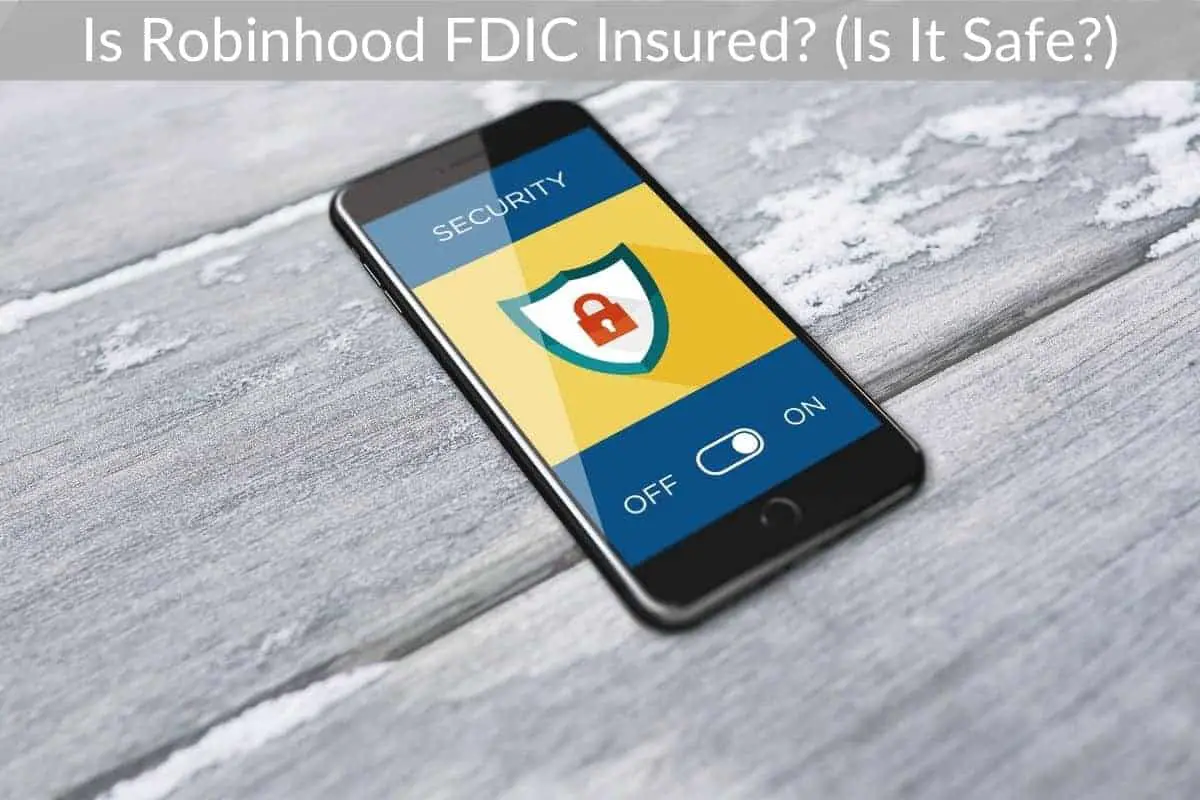Table of Contents
*This post may contain affiliate links. As an Amazon Associate we earn from qualifying purchases.
Robinhood holds millions of dollars in cash deposits and investments. Whether you use Robinhood or Robinhood Crypto, you more than likely want your money protected and insured.
The two biggest insurances for investment firms are FDIC and SIPC, leading many people to wonder which one Robinhood uses.
Robinhood is FDIC insured up to $250,000 for each deposit into a checking or savings account, but your investments through the company are protected by a SIPC plan. SIPC insurance guards your securities by up to $500,000 and cash claims for $250,000 or less.
Anything over these limits isn’t insured.
It’s important to note that these insurances don’t cover loss of funds due to market fluctuations. Instead it covered your funds in the event of a hack or theft at the brokerage.
If you trade stocks, options, and crypto on Robinhood you can make or lose money and that isn’t covered by any insurance.
In this article, I will go into more detail about how your deposits and investments are protected by Robinhood, which insurance method is safer, and if Robinhood is a trustworthy company for large financial transactions.
What Insurance Does Robinhood Have?
Robinhood has SIPC and FDIC insurance coverage for various parts of investments, checking accounts, savings accounts, and cryptocurrency exchanges. Its policies cover between $250,000 to $500,000, depending on the deposit type and purpose.
Crypto exchanges aren’t covered by SIPC or FDIC, though.
Here’s what you need to know about Robinhood’s insurance policies:
- Robinhood isn’t a bank, but they offer debit cards through Sutton Bank that are FDIC insured. According to Robinhood, its Cash Management feature protects up to $1,250,000 in deposits through the debit card. Each deposit has to be no greater than $250,000 to have the maximum insurance benefits.
- The company protects up to $500,000 in securities, but only $250,000 for cash claims. The SIPC insurance policy allows you to file a complaint if your money is stolen in one way or another, but the claim can’t exceed the aforementioned amount. In other words, you can lose anything over $500,000.
- If you don’t use Robinhood’s debit card or Cash Management system, you won’t receive deposit protection. While it’s not much of an issue since the money is protected once it’s invested, cash deposits are a crucial part of the process for day traders. It’s important to analyze how much you deposit and how quickly you invest the cash.
- Your money is safer when it’s invested with Robinhood than when it’s sitting in escrow or in your cash space (unless you have their debit card program). Robinhood focuses its efforts on safeguarding investments and securities, so you’re better off investing your deposits and dividends rather than letting them sit in the account.
- Robinhood doesn’t track deposit, investment, or security issues. It’s up to you to file a complaint or claim if something goes wrong. There are too many users for the firm to manage every account, so its insurance policies aren’t activated until you mention something to the company.
As you can see, Robinhood offers plenty of insurance protection from various types of fraud. However, not everything is protected.
You have to be at the forefront of your investments and deposits to ensure nothing goes awry. Keep a tracking log or use Robinhood’s tracking feature to review withdrawals and deposits.
Is Robinhood Safe To Keep Money In?
Robinhood is safe to keep money in because it has trustworthy insurance policies that protect hundreds of thousands of dollars in deposits and securities. However, Robinhood doesn’t have major insurance policies for its crypto exchange.
The firm protects its crypto with guarantees instead.
So, should you trust Robinhood?
- Do you have less than $500,000 in your account? Robinhood’s SIPC plan doesn’t cover anything over $500,000 in securities, which means you’re out of luck if you lose a greater sum. However, their FDIC plan can cover much more for cash deposits, but not securities and investments.
- Do you have a Cash Management account with Robinhood? Wallstreet Survivor shows Robinhood covers anything at $250,000 or less with this system. Your money will be double covered if you have a checking account with them since it’s also covered by Sutton Bank, their primary banking company.
- Are you investing in crypto? Robinhood Crypto isn’t covered by FDIC or SIPC, but the company has a few guarantees in place to protect your money. Nevertheless, the lack of high-profile insurance companies can make a lot of people nervous about investing in their commission-free crypto exchange.
- How big are the deposits you’re making? If you can keep your deposits below $250,000, you have nothing to worry about. Robinhood is the ideal choice for most investors who don’t want to exchange millions of dollars. That being said, it might not be the top choice for high-end investors.
Robinhood is more than safe for most people. It’s important to remember the FDIC and SIPC guidelines are uniform and in place for all firms who go through them. Robinhood has the only plan that’s offered, so you wouldn’t have better SIPC or FDIC insurance elsewhere.
Which Is Safer FDIC Or SIPC?
FDIC is safer for deposits because you can insure over $1,000,000 split into four transactions of $250,000, but SIPC is safer for investments because you can invest up to $500,000 of insured money. Robinhood uses both policies for various purposes, so your money is covered from start to finish.
These insurances truly can’t be compared to one another, considering they’re used for different purposes. FDIC is designed to protect deposits, whereas SIPC is designed to protect securities.
Having both at your disposal is the best option, which is why Robinhood is such a good company for so many investors.
Robinhood explains that their crypto exchange isn’t insured by either SIPC or FDIC, but it’s covered by a designated security team and crime insurance. Both of these groups can protect and back your coins if anything goes wrong.
Final Thoughts
Now that you know the insurance limits for Robinhood investments and accounts, you can decide if it’s the right company for you. If you’re a big investor, it might be worth investing in another brokerage firm.
However, retail investors with less than $250,000 in their account would be completely safe to use Robinhood.

